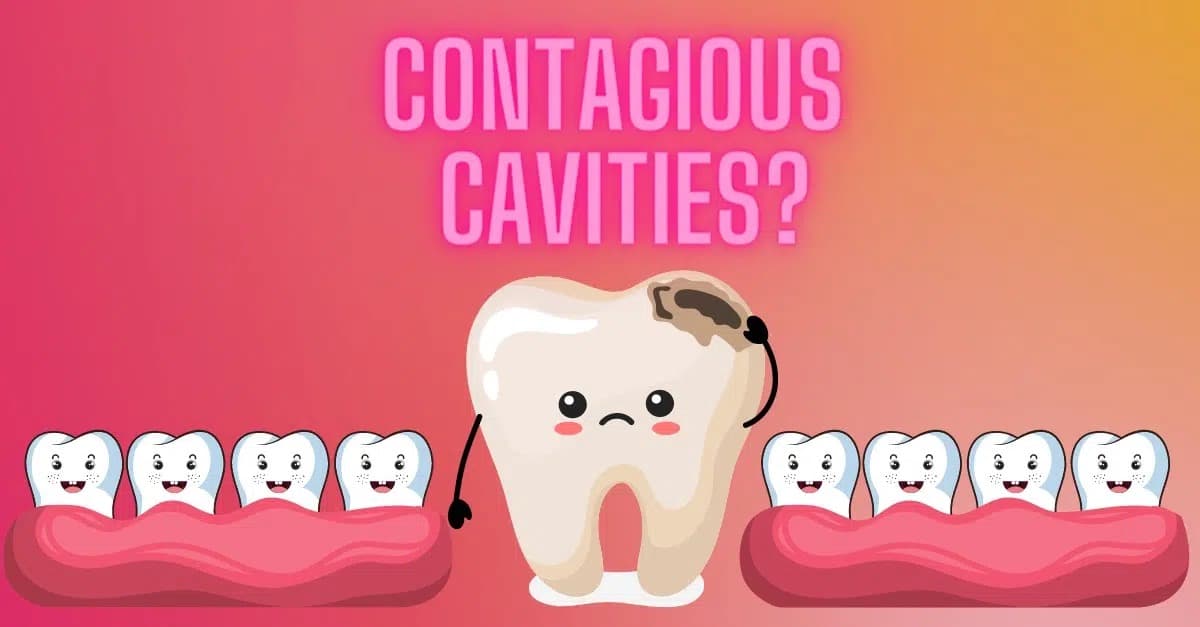Everyone knows you can catch a cold from someone else but did you know you can catch a cavity from someone? It’s true! Just like germs and viruses that spread from one person to another, cavities can be contagious.
How do cavities spread, you might want to know? Bacteria. It causes gum disease and cavities. That bacteria in your mouth can spread to someone else’s mouth by sharing saliva through kissing or food sharing.
What Causes Cavities?
First, how are cavities created in the first place? Food, candy, snacks, and sugary drinks all leave deposits on your teeth and gums called plaque. This causes tooth decay to start. If you don’t regularly brush and floss your teeth (or do it correctly), this turns into bacteria which causes cavities. You may not even know you have a cavity forming. It may not hurt or cause you any other symptoms (at first).
How Can They Become Contagious?
Studies have found that when one person has bad oral health, they can share those germs with others unknowingly.
- The most common way: kissing.
- Second most common way: sharing food
How Does Sharing Food with Your Child Cause Cavities?
There is plenty of evidence that parents or other caregivers of small children can pass cavity-causing bacteria along to a child by sharing food. Researchers have found that 30% of 3-month-old infants, 60% of 6-month-old babies, and 80% of 2-year-old toddlers were infected with Streptococcus mutans. This particular bacteria naturally forms in your mouth.
But how did you pass it on to your child?
How many of you have done this with your child when trying to get them to try a new food they are unsure about?
- A spoonful of food for you (yummy) and then a spoonful of food for the baby.
- Is the food too hot? Let mom test it first.
- Not sure if the pacifier is clean? Put it in your mouth first, then popped it into the baby’s mouth.
- Or with older kids, you take a bite of an apple and then they take a bite.
- You lick their ice cream, then they lick it. Do you get the picture?
You’ve just shared your saliva with your child.
Babies and young children are very vulnerable to bacteria that can cause cavities. Many times a child’s cavity can be blamed on their caregiver.

How Do You Prevent Sharing Cavities?
Well, the obvious one would be to not share food, cups or spoons, and such. But sometimes that just isn’t possible.
Also, do you have to stop kissing your loved one as well? No.
The best approach is to make sure you, your loved ones, and your children have the best preventative oral care. What is that?

Preventive Care for You and Your Loved Ones
- Brush well after meals
- Floss with dental floss or water flosser at least once a day
- Rinse your mouth with water after drinking any sugary drinks (or avoid them altogether)
- Avoid sugary snacks
- Use toothpaste or mouthwash with fluoride
- See your dentist and hygienist on a regular basis for cleanings and oral health checkups. At least once a year or more if recommended
- Check with your dentist about sealants, which can help prevent some cavities
Babies and Toddlers
- Don’t let them fall asleep with a bottle in their mouth
- Wipe your toddler’s new emerging teeth off with a soft clean cloth or soft baby toothbrush before bedtime
- Take your child in for their first dental visit when they are one year old. We can give you lots of tips on how to care for those new little baby teeth and prevent any cavities
- Don’t share food, cups, eating utensils, etc.
Just remember, if everyone has healthy oral care to begin with, there isn’t anything to worry about. To be on the safe side though, use the above preventative care recommendations. And give us a call if you have more questions. We are here to help you and your loved ones have the best oral care possible.
Special
Congratulations to all High School and College Graduates!
If you are a 2022 grad, our gift to you (current patients*) is a FREE teeth whitening treatment.
*If you’re not a current patient, set up an appointment for a consultation and teeth cleaning first. Then get your free teeth whitening treatment.

